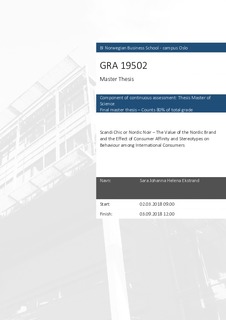Scandi Chic or Nordic Noir – The Value of the Nordic Brand and the Effect of Consumer Affinity and Stereotypes on Behaviour among International Consumers
Master thesis
Permanent lenke
http://hdl.handle.net/11250/2580141Utgivelsesdato
2018Metadata
Vis full innførselSamlinger
- Master of Science [1621]
Sammendrag
In this thesis I have explored the effectiveness and implications of the relatively
new construct of consumer affinity and its potential ability to determine or predict
consumer behaviour and preference for brands and products originating from the
Nordic region. The theoretical discussion builds upon the well-researched area of
country-of-origin and nation branding. Additionally, I compare the effectiveness of
consumer affinity with that of stereotypes and broaden the affinity construct by
comparing it to the construct of brand love. The relationship between the
independent and dependent variables finally considers product category and preexisting
knowledge as moderating variables.
A total of 146 respondents from different parts of the world were asked to evaluate
four Nordic brands (Norwegian, IKEA, Noma and Hurtigruten) in selfadministered
questionnaires.
My results show that consumer affinity does have an effect on consumer behaviour
and significantly increase both purchase intention and brand evaluation for all
brands and product categories. The affinity effect is further dependent on the
reported familiarity and knowledge of the Nordic region, but irrespective of the
number of times the consumer has visited the region. Hence, it is possible to
develop deeper affinity already after one single visit, and managers should focus on
providing more unique knowledge and “hidden secrets” about the region that is not
already generally known, instead of repeating well-known figures and facts, and
communicate shared values and norms. People having affinity towards the region
evaluated all brands, regardless of category more favourably. There was further no
difference between normative and personal affinity. Hence, both can be equally
strong determinants of consumer affinity, and managers could feel comfortable in
using convenient normative sources when trying to develop consumer affinity.
Finally, even though the Nordic region was perceived as more stereotypically
competent, than warm, but the effect on consumer behaviour did not differ between
product categories.
Beskrivelse
Masteroppgave(MSc) in Master of Science in Strategic Marketing Management - Handelshøyskolen BI, 2018
